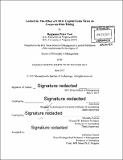Locked-in : the effect of CEOs' capital gains taxes on corporate risk-taking
Author(s)
Yost, Benjamin Peter
DownloadFull printable version (7.954Mb)
Alternative title
Effect of Chief executive Officer's capital gains taxes on corporate risk-taking
Other Contributors
Sloan School of Management.
Advisor
John Core and Michelle Hanlon.
Terms of use
Metadata
Show full item recordAbstract
I study the effects of CEOs' unrealized capital gains tax liabilities (tax burdens) on corporate risk-taking. Recent work suggests that high tax burdens discourage CEOs from selling stock. I hypothesize that this causes the executives to become overexposed to firm-specific risk thereby reducing their willingness to make risky corporate decisions. In a series of tests, I find that corporate risk-taking decreases as CEOs' personal tax burdens increase. Further, firms with CEOs who are more locked-in to their stock positions (i.e., CEOs with higher tax burdens) experience larger increases in risk-taking following federal and state tax cuts. When I investigate the mechanism behind this relation, I find that tax cuts trigger stock sales by the locked-in executives, allowing for improved diversification. Overall, my findings indicate that the personal tax burdens of CEOs affect the firm by reducing executives' preferences for risk at the corporate level.
Description
Thesis: Ph. D., Massachusetts Institute of Technology, Sloan School of Management, 2017. Cataloged from PDF version of thesis. Includes bibliographical references (pages 43-47).
Date issued
2017Department
Sloan School of ManagementPublisher
Massachusetts Institute of Technology
Keywords
Sloan School of Management.